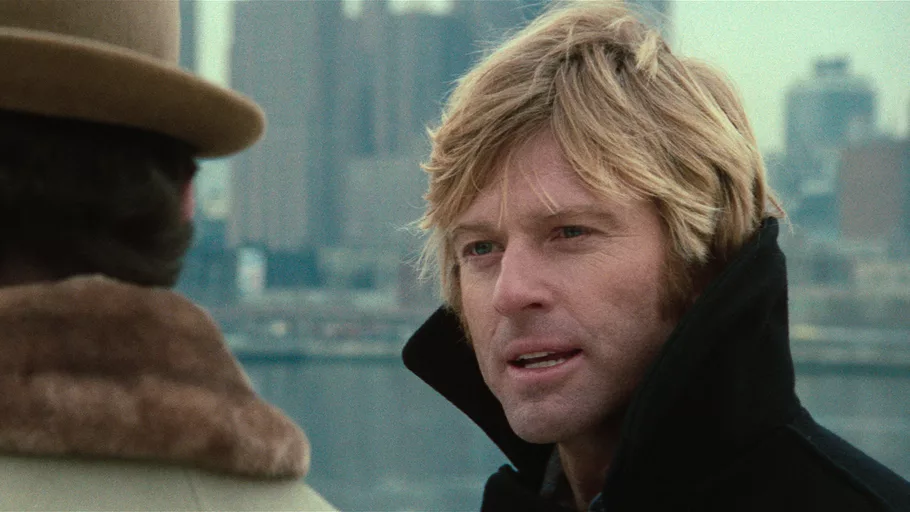United States, 1975
Directed by Sydney Pollack
With Robert Redford (Joseph Turner), Faye Dunaway (Kathy Hake), Cliff Robertson (Higgins), Max von Sydow (Joubert)

Joseph Turner first appears on a moped, relaxed but late for his work in New York. He is a researcher in literary society which turns out to be a front for a CIA unit whose brief is arguably original: its staff is tasked with sifting through countless fictions published around the world so as to find clues on spy games and tactics. It begs belief that such a Herculean inquiring work is really necessary and useful to fight the enemies but this is what prompts a small posse of armed to barge into the building where the CIA unit is based to kill all the employees – though they miss of course Joseph Turner who left the place earlier through an unauthorized exit door to get lunch. When he is back he discovers the carnage and freaks out.
Smiling face and benevolent behavior give way to paranoid behavior and tense looks. The CIA must deal with a bookish and youngish man in a funk and in fear. He cannot grasp what is going on and has no training in weapons and fighting. His instincts are shaped by suspicion, and rightly so, for when he meets his station chief, the spy tries to kill him – but this is another miss. To survive Joseph Turner would force a woman met by chance, Kathy Hake, to shelter him and help him. She is unsurprisingly reluctant but in a romantic twist she lets herself be seduced and eventually she aids him in his efforts to find out the truth.
This is a tough order as he lacks info and as he sits between a rock and a hard place. On the one hand the CIA official he has contacted, Higgins, wants to know where Joseph Turner is and to bring him to the headquarters to be interrogated as a prime suspect for treason, on the other hand he is chased by a distinguished and quiet fellow named Joubert, who is the man who led the murderous squad who did his colleagues in and now wants to wrap up the task he has been paid for.
The plot shows how Joseph Turner puts the puzzle’s pieces together and enlists Higgins to unravel what is going on inside the Central Intelligence Agency. The affair does deal with treason, but it is coming from another person who has planned to use spy games to his own benefit, running a bunch of sidekicks inside the CIA and dead sure (but why?) that Joseph Turner and his late colleagues had unmasked him. The bad guy is done away but Joseph Turner makes the choice not to play it safe; he does not want to work again for an intelligence community he deems unworthy of his trust and of anyone’s trust indeed.
This is the post-Watergate United States, deep in an economic crisis and rife with scandals. Joseph Turner is an epitome of the average nice guy ready to support the motherland but trapped by a deceitful and undemocratic apparatus. His journey in fear and in violence stirs the consciences easily as it echoes the disillusioned feeling spreading in the nation back then. But there is nothing formulaic in the character the camera carefully tracked, thanks to the talent of committed and inspired Robert Redford – in fact the role seems tailored for him and he proves as seductive and relatable as usual – and the cunning moves the screenplay allows him to make. Watching a rather cheerful scholar with no practical knowledge of the spy tricks becoming an astute operator at ease with telephone lines and exchanges or with kidnappings is fairly riveting. “He reads a lot”, Higgins tells his chiefs to describe him at the start of the chase and the distance he is eventually forced to walk with only this baggage with him to become a true, fearless, honest hero is impressive.
Joseph Turner’s nemesis is a fascinating character on his own right, played with elegance by the great Max Von Sydow. Joubert is a cold-blooded and rational killer, but the way he makes his judgments and reckons his moves implies a deep, impressive, if frightening, command of human psychology. His journey inside the narrative, from aiding a parallel network to helping the CIA terminate it, is a show of cynicism that feeds the underlying criticism against this arm of the government. But his personal concern for Joseph Turner at the end hints at a more sensible and lucid character, perfectly aware of the treacherous nature of both his trade and the human nature. His words clearly have an impact on the lead and his willingness to suggest him a way out betrays his respect for a man unexpectedly and unfairly challenged by fate.
“Three Days of the Condor” is a fast-paced, solid act of suspense, filled with gripping actions laced with a touch of romanticism and politically charged, lasting barely two hours. Shooting and editing carefully put the pieces together while giving the various characters the chance to be substantial and the episodes the possibility to develop convincingly. The camera tracks the technological tricks and prowess of the intelligence business with a visual flair that never gets lost in high tech pyrotechnics (a welcome change from times so obsessed with special effects, even though the 1974 technology looks fairly like a dinosaur’s world). This is serious entertainment (even with those rather contrived romantic episodes) shot by a Sidney Pollack intent on making a solidly liberal and seriously crafted film, eventually delivering a satisfactory direction of the actors and a great shooting of the locations, while dealing with the disturbing, but not that far-fetched, possibility of watching key institutions becoming unreliable, their operators becoming roguish, and their founding principles subverted.

